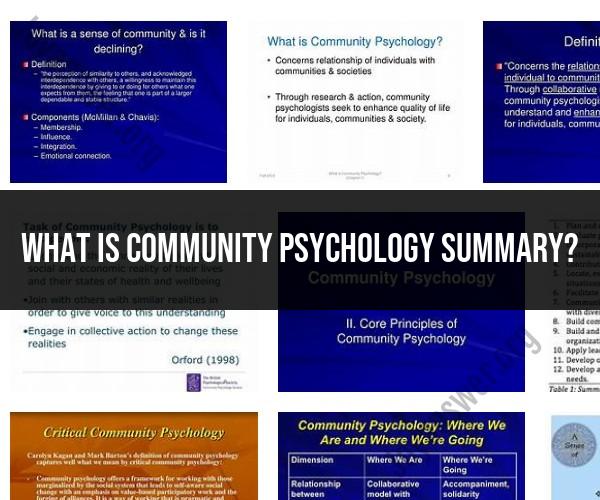What is community psychology summary?
Community psychology is a branch of psychology that focuses on understanding and improving the well-being of individuals within the context of their communities and social environments. Here's a brief summary of community psychology:
1. Emphasis on Community: Community psychology goes beyond individual-focused approaches to psychology and looks at the broader social, cultural, and environmental factors that influence people's lives. It considers the impact of communities, neighborhoods, and societal structures on mental health and well-being.
2. Prevention and Intervention: Community psychologists are often concerned with preventing psychological problems and promoting mental health at the community level. They work on developing interventions and programs that address the root causes of issues like substance abuse, violence, and social inequality.
3. Social Justice: A key principle of community psychology is social justice. It aims to reduce disparities and inequities in access to resources, opportunities, and mental health services. Community psychologists advocate for policies and practices that promote fairness and equality.
4. Empowerment: Community psychology values the empowerment of individuals and communities. It seeks to build the capacity of communities to address their own challenges and make decisions that affect their well-being. Collaboration and participation are central to this approach.
5. Ecological Perspective: Community psychologists take an ecological perspective, considering the complex interplay of factors at multiple levels, including individual, family, community, and societal levels. This perspective helps in understanding the dynamics of community issues.
6. Research and Evaluation: Community psychologists conduct research to assess community needs, evaluate program effectiveness, and contribute to evidence-based practices. They use research findings to inform interventions and policies.
7. Interdisciplinary Approach: Community psychology often involves collaboration with professionals from various fields, including sociology, public health, social work, and education. This interdisciplinary approach helps address multifaceted community issues.
8. Prevention and Promotion: Rather than focusing solely on treating psychological disorders, community psychology places a strong emphasis on prevention and the promotion of mental health and well-being. It seeks to create environments that support healthy development.
9. Advocacy and Activism: Community psychologists are often advocates for social change. They work to raise awareness of social injustices, advocate for policies that benefit marginalized populations, and promote community engagement.
10. Community-Based Research: Research in community psychology frequently involves working directly with communities to identify needs, gather data, and develop solutions collaboratively. This participatory research approach respects the voices and experiences of community members.
In summary, community psychology is a field of psychology that takes a holistic and community-centered approach to understanding and addressing mental health and social issues. It is rooted in principles of social justice, empowerment, and collaboration, with the ultimate goal of creating healthier, more equitable communities.












